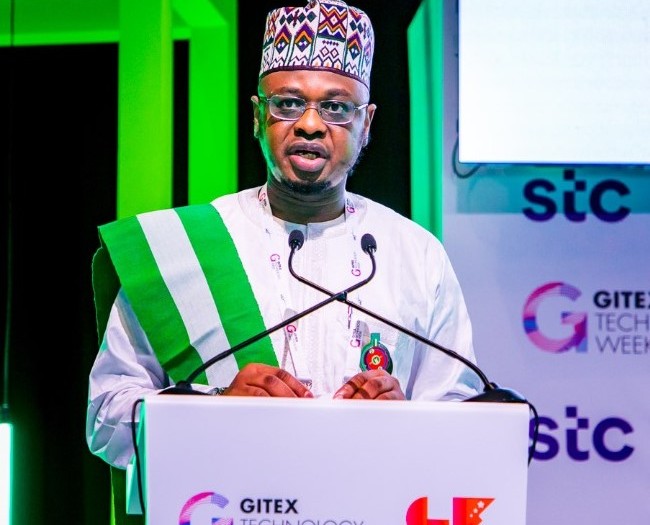GITEX 2020: Nigerians Provide Digital Solutions to COVID-19, Other Challenges- Pantami
TECH DIGEST – Nigerian scientists and digital entrepreneurs are providing digital solutions to COVID-19 and other global challenges.
The Minister of Communications and Digital Economy Dr. Isa Pantami who leads the Nigerian delegation at the 40th edition of the Gulf Information Technology Exhibition (GITEX) 2020 in Dubai, said Nigerians are contributing to technological innovations in different sectors.
Delivering his keynote address at the Africa Investment Forum (AIF) titled: “Nigeria’s Digital Economy: A Golden Investment Opportunity,” Dr. Pantami said Innovation is second-nature to Nigerians and there are so many Nigerians that have made their mark through innovative solutions that they have developed.
“I will mention a few that relate to solutions that focus on enabling people to live normal lives in spite of the COVID-19 pandemic. A Nigerian-trained Doctor, is credited for playing a leading role in the development of the Pfizer COVID-19 vaccine. Reports indicate that this vaccine is expected to pull in more than $8 billion in revenue by the end of 2021.
“Another Nigerian developed Koniku, a device that uses artificial intelligence to create an electronic-nose that can ‘smell’ the COVID virus. A deal has already been signed by Airbus to deploy this solution on their aircraft. Other non-COVID solutions include HopStop that was developed by a Nigerian and sold to Apple for $1billion,” the Minister said.
PRNigeria reports that the Nigerians Onyema Ogbuagu, a medical doctor in USA is one of the brains behind the research at Pfizer for the potential world’s first effective coronavirus vaccine, while Oshiorenoya Agabi, the founder of Koniku, a Silicon Valley-based startup that designed high-tech sensors made from genetically modified living cells that can detect odours in the air.
Speaking on African potentials for greatness in through technological advancements and partnership with prospective investors,
Pantami said Africa has the market for prospective investors with about 1.3 billion population and the projection of the United Nations that the continent would account for a quarter of the global population by 2050, where 50% of would-be below the age of 25 years.
“Africa has a massive geographical size that is almost the size of Europe and North America combined. It also accounts for a significant portion of the world’s natural resources, much of which are used for the manufacturing of ICT devices. For instance, materials like tantalite and cobalt are very useful in the production of laptops, batteries and other electronics; 71% of the world’s tantalum comes from Africa while the continent meets 58% of the world’s global cobalt needs.”
Describing Nigeria as a strategic gateway for investing in Africa, Pantami said the country is both a geographic and an economic gateway to sub-Saharan Africa.
“As a geographic gateway, we have a prime location between West and Central Africa. In other words, investing in Nigeria gives investors easy access to close to 550 million people- 200 million from Nigeria, another 200 million West Africans and about 150 million Central Africans.
“On the economic front, Nigeria has the largest economy in Africa, with a 2019 GDP estimate by the World Bank putting our GDP at $448 billion. Nigeria is part of the African Continental Free Trade Agreement (AfCFTA) and it gives us access to the African continent covering an area worth over US$3 trillion in GDP and eliminates tariffs on 90% of goods traded across the continent. This is no doubt a unique opportunity for investors in Nigeria.
“With a population having an average age of 18.2 years, Nigeria is the 14th youngest country on earth, with close to 44% of the population below the age of 15 years, according to the World Bank. Such a population of ‘digital natives’ can play a leading role in the global digital economy. Investors in our digital economy can be assured of access to a large pool of youthful and skilful employees at a more cost-effective rate than it would cost to engage employees in other parts of the world.”
While inviting foreign investments into the country, the Minister said Nigeria has a potential critical mass of innovative ‘digital natives’ that could provide the talent needed by any investor. The creative Nigerians, according to him could play a key role in the creation of digital jobs across all sectors of the country; jobs that are either based on or are dependent upon ICTs.
Speaking on the redesignation of Federal Ministry of Communications and Digital Economy by President Muhammadu Buhari, Dr. Pantami said his Ministry now focuses on providing support for the development of Nigeria’s digital economy.
“We started by developing a National Digital Economy Policy and Strategy (NDEPS) for a Digital Nigeria. This document was unveiled and launched by Mr President on the 28th of November, 2019.
He said NDEPS currently provides a holistic and sustainable approach towards the development of the nation’s digital economy, is based on eight pillars.
Some of the pillars include: Developmental Regulation; Digital Literacy and Skills; Solid infrastructure; Service Infrastructure; Digital Services Development and Promotion.
Others include Soft Infrastructure, Digital Society and Emerging Technologies and Indigenous Content Development and Adoption.
PRNigeria reports that Gitex Technology Week in Dubai showcases the diversity of the global technology industry, hosting over 1,200 exhibitors, including over 300 startups, from over 60 countries.
By PRNigeria
















